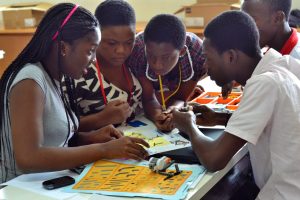31 October 2017. Author: Nathalie Risse PH.D., Thematic Expert for 2030 Agenda for Sustainable Development (Canada)
- The Foundation for Environmental Stewardship (FES) has launched the SDGs Youth Training Canada Series, a project that mobilizes 10,000 Canadian youth to advocate and implement the SDGs through 100 local actions and 50 trainings in colleges and universities across Canada in 2017.
- In the 2017 Global Forum for Responsible Management Education ’s Outcomes Declaration, representatives and stakeholders of business and management schools and Higher Education Institutions committed to contribute to achieving the SDGs and to make their individual efforts more coordinated, visible and effective.
- The SDG Fund announced the establishment of a SDG Chair, or Academic Chair on Development and Poverty Eradication, to promote the engagement of universities around the world in achieving the 2030 Agenda.
October 2017: In celebration of Canada 150, the 150th anniversary of Canada, the Foundation for Environmental Stewardship (FES) has launched the Sustainable Development Goals (SDGs) Youth Training Canada Series, a project that mobilizes 10,000 Canadian youth to advocate and implement the SDGs. The project mobilizes UN staff with extensive experience in designing, communicating or implementing the SDGs to train students in SDG advocacy and implementation.
The SDGs Youth Training Canada Series aims to mobilize Canadian youth through 100 local actions and 50 trainings in colleges and universities across Canada in 2017. The trainings focus on three areas of skills: awareness campaign; university engagement; and policy advocacy.
The SDGs Youth Training Canada Series provides, inter alia: a step-by-step toolkit for hosting SDGs Youth Training; connections for follow-up actions; a network of 10,000 SDGs youth trainees in Canada; and opportunities to network with UN staff. Steve Lee, a 24-year-old climate change activist and a policy advocate to the UN, founded FES and serves as its Executive Director.
Among the universities that took part in the training, FES reports that the University of Toronto trained more than 150 students; McGill University trained approximately 400 students; and the University of Waterloo, the University of Ontario Institute of Technology and Humber College trained almost 1,000 students in January 2017. In addition, 265 university and high school students attended an SDG Workshop at St. Thomas University and the University of New Brunswick campuses. Additional trainings are planned at numerous universities across Canada. After the training sessions, students developed strategies and plans for implementing SDGs in their community.
Also on education, representatives and stakeholders of the business and management schools and Higher Education Institutions (HEIs) committed to contribute to achieving the SDGs and to make their individual efforts more coordinated, visible and effective. This commitment is part of the Outcomes Declaration of the 2017 Global Forum for Responsible Management Education , organized by the Principles for Responsible Management Education (PRME) in July 2017. The Outcomes Declaration was adopted by nearly 300 deans, faculty, and thought leaders during the Forum.
In a 2016 global survey on business students around the world and their attitudes towards responsible management education and corporate social responsibility (CSR), 75 percent of respondents agreed their business school should teach more about the SDGs and the role of business in achieving them. PRME and the Macquarie Graduate School of Management (MGSM) in Australia conducted the survey.
The SDG Fund has established an Academic Chair on Development and Poverty Eradication to promote the engagement of universities around the world in achieving the 2030 Agenda through training, advocacy and research activities.
In addition, the SDG Fund announced it has established a SDG Chair, or Academic Chair on Development and Poverty Eradication, as a joint initiative with the Universidad Rey Juan Carlos in Spain and the network Universities for Poverty Alleviation. The initiative aims to promote the engagement of universities around the world in achieving the 2030 Agenda for Sustainable Development through training, advocacy and research activities.


